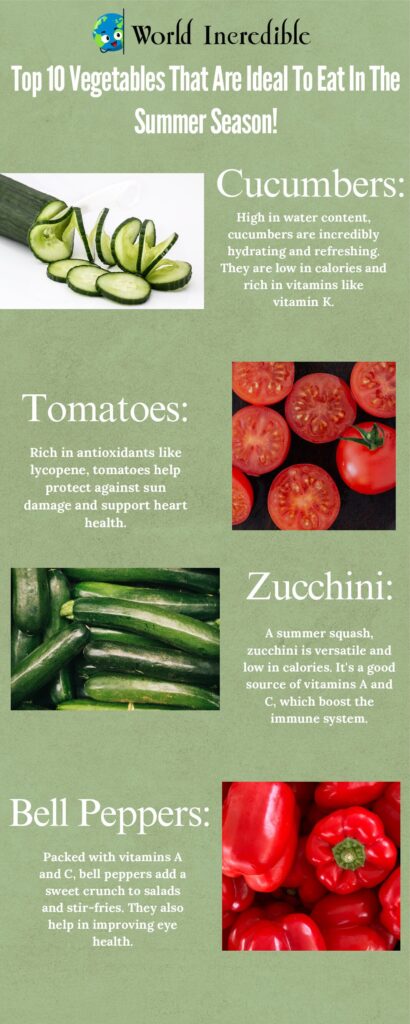
Top 20 Vegetables You Have to Eat in the Summer Season:
Summer brings a bounty of fresh and vibrant vegetables that are delicious and packed with nutrients. Whether you want to cool down, stay hydrated, or boost your health, these Top 20 Vegetables are must-haves for your summer diet.
1. Cucumbers
Crisp and refreshing, cucumbers are perfect for hydrating on hot summer days. They are low in calories and high in water content, making them ideal for salads, smoothies, and even as a healthy snack.
2. Tomatoes
Juicy and bursting with flavor, tomatoes are a summer staple. Rich in lycopene, they are great for your heart and skin. Enjoy them in salads, salsas, or just sliced with a sprinkle of salt.
3. Zucchini
Zucchini is a versatile vegetable that can be grilled, sautéed, or spiralized into noodles. It’s low in calories and high in vitamins A and C, making it a great addition to your summer meals.
4. Bell Peppers
Colorful and sweet, bell peppers are packed with antioxidants, including vitamin C. They are perfect for adding a pop of color and crunch to salads, stir-fries, or grilled dishes.
5. Eggplant
Eggplant is a summer vegetable that absorbs flavors beautifully, making it a great addition to various dishes. It’s rich in fiber and antioxidants, particularly nasunin, which protects brain cells.
6. Green Beans
Green beans are a nutritious summer vegetable rich in fiber, vitamins, and minerals. They can be steamed, sautéed, or added to salads for a crunchy texture.
7. Okra
Okra is a unique vegetable that’s popular in summer for its slimy texture, which can thicken soups and stews. It’s rich in fiber, vitamins C and K, and folate.
8. Corn
Sweet corn is a classic summer vegetable that’s high in fiber and antioxidants like lutein and zeaxanthin, which are good for your eyes. Enjoy it grilled, boiled, or in a fresh summer salad.
9. Spinach
Spinach is a leafy green that’s packed with iron, calcium, and vitamins A, C, and K. It’s versatile and can be used in salads, smoothies, or as a cooked side dish.
10. Lettuce
Lettuce is a refreshing base for salads and sandwiches during the summer. It’s low in calories and high in water content, making it a hydrating choice.
11. Summer Squash
Summer squash, including varieties like yellow squash and pattypan, is tender and slightly sweet. It’s a good source of vitamin C and manganese and can be grilled, roasted, or sautéed.
12. Radishes
Radishes add a peppery crunch to your summer salads and dishes. They are low in calories and high in vitamin C and antioxidants, which help fight inflammation.
13. Carrots
Carrots are rich in beta-carotene, which your body converts into vitamin A, essential for good vision. They add a sweet, crunchy texture to salads and slaws.
14. Beets
Beets are a nutrient-dense root vegetable with a sweet, earthy flavor. They are high in fiber, folate, and antioxidants, and they add vibrant color to any dish.
15. Peas
Fresh peas are a summer treat that’s high in protein, fiber, and vitamins. They can be enjoyed raw, steamed, or added to salads and pastas.
16. Bok Choy
Bok choy is a Chinese cabbage rich in vitamins A, C, and K, as well as calcium. It’s great for stir-fries, soups, and salads.
17. Kale
Kale is a nutrient powerhouse, loaded with vitamins A, C, and K, as well as antioxidants. It’s sturdy enough for salads and can also be sautéed or blended into smoothies.
18. Celery
Celery is a crunchy, hydrating vegetable that’s low in calories and high in fiber and vitamins. It’s perfect for snacks, salads, or as a flavor base for soups.
19. Swiss Chard
Swiss chard is a leafy green that’s rich in vitamins A, C, and K, as well as magnesium and potassium. It’s great in sautés, salads, or as a healthy side dish.
20. Arugula
Arugula adds a peppery bite to salads and sandwiches. It’s rich in calcium, potassium, and folate, making it a nutritious addition to your summer diet.
Vegetables Benefits to Eat in the Summer Season
As the temperature rises and the days grow longer, our bodies crave foods that are light, hydrating, and packed with nutrients to keep us cool and energized. Vegetables are an essential part of a healthy summer diet, offering a wide range of benefits that can help you stay refreshed and nourished. Here’s a look at some of the best vegetables to eat during the summer season and the incredible benefits they provide.
1. Cucumbers: The Ultimate Hydrator
Cucumbers are composed of over 90% water, making them one of the most hydrating vegetables you can eat during the summer. They help keep you cool and refreshed while also providing essential nutrients like vitamin K, vitamin C, and potassium. Cucumbers are also low in calories, making them a great choice for those looking to maintain a healthy weight.
Benefits:
- Hydrates and cools the body
- Supports skin health with antioxidants
- Promotes weight loss due to low-calorie content
2. Tomatoes: Nature’s Sunscreen
Tomatoes are rich in lycopene, an antioxidant that helps protect your skin from UV damage caused by the sun. Eating tomatoes regularly during the summer can act as an internal sunscreen, reducing the risk of sunburn and long-term skin damage. Tomatoes are also a great source of vitamins A and C, which boost the immune system and promote healthy skin.
Benefits:
- Protects skin from sun damage
- Supports immune health
- Improves heart health with potassium and fiber
3. Bell Peppers: A Burst of Vitamin C
Bell peppers are colorful, crunchy, and packed with vitamin C—one of the most important nutrients for boosting your immune system and keeping your skin healthy. Red, yellow, and orange bell peppers are especially high in antioxidants that help fight inflammation and keep you energized during the hot summer months.
Benefits:
- Boosts immune system
- Supports skin health with high vitamin C content
- Reduces inflammation
4. Zucchini: The Low-Calorie Powerhouse
Zucchini is a versatile summer vegetable that’s low in calories but high in essential nutrients like vitamin A, vitamin C, and potassium. It’s also rich in fiber, which aids digestion and helps keep you feeling full longer. Zucchini can be grilled, sautéed, or even spiralized into noodles, making it a delicious and nutritious addition to any summer meal.
Benefits:
- Supports digestive health
- Helps with weight management
- Provides essential vitamins and minerals
5. Leafy Greens: The Nutrient-Dense Staple
Leafy greens like spinach, kale, and arugula are packed with vitamins, minerals, and antioxidants that are vital for overall health. These greens are especially beneficial in the summer as they are light, easy to digest, and can be enjoyed in refreshing salads. They are excellent sources of vitamins A, C, and K, as well as iron and calcium.
Benefits:
- Supports bone health with calcium and vitamin K
- Boosts energy levels with iron
- Promotes healthy digestion
6. Eggplant: The Versatile Veggie
Eggplant is another summer favorite that’s low in calories and rich in fiber. It’s also packed with antioxidants, particularly nasunin, which helps protect brain cells from damage. Eggplant can be grilled, roasted, or added to a variety of dishes for a nutritious and flavorful meal.
Benefits:
- Supports brain health with antioxidants
- Aids in digestion with high fiber content
- Low in calories, aiding weight management
Conclusion
Incorporating these vibrant and nutritious vegetables into your summer meals not only enhances flavor but also supports your overall health. Whether you’re enjoying them raw in salads or cooked in various dishes, these summer vegetables are essential for a healthy and refreshing diet. Enjoy the taste of summer with these top picks!













